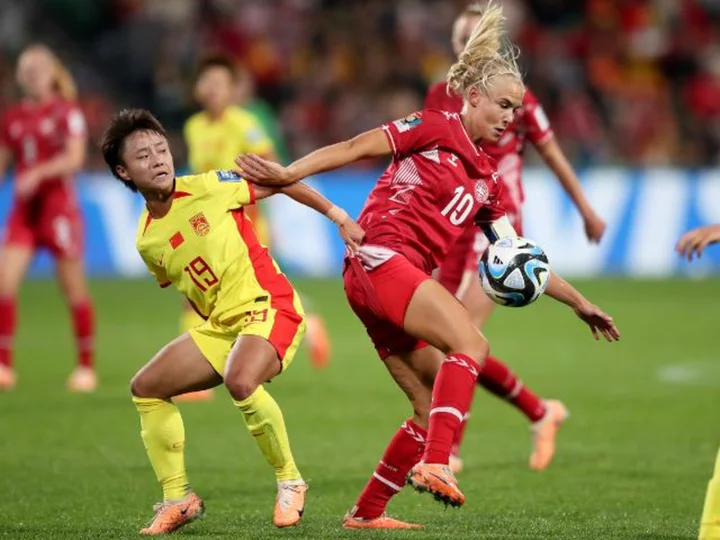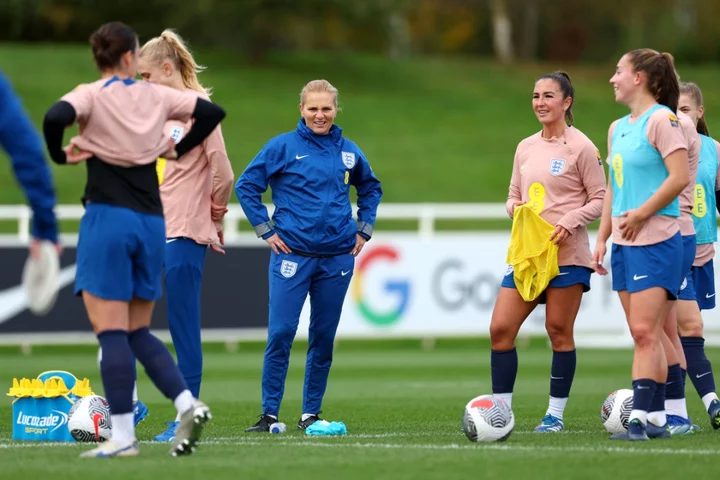With a tied score and two minutes left to play after a stunning second-half comeback, China's women's soccer team finally scored the goal that had eluded them for 16 years.
That winning goal, which earned the team their first AFC Asian Cup since 2006, reverberated across the country. Fans who'd long been left hungry for glory from a mens or womens national team scrawled exuberant posts on social media, and at least one prominent sportscaster admitting to crying tears of joy.
Eighteen months later, that win also landed the team at the 2023 FIFA Women's World Cup in Australia and New Zealand, where the team and its coach Shui Qingxia have a chance to show that was just the opening shot in China's rise to reclaim its place as a dominant force in the women's sport.
"We will fight game by game," vowed head coach Shui, who is a veteran of the golden era of Chinese women's soccer -- a period that saw the team take silver in the 1996 Olympics and lose the 1999 World Cup by a single penalty kick against long time rivals the United States.
Much has changed in the women's sport since that time. The rapid development of women's soccer programs across Europe and the Americas has fielded a new generation of powerful teams-to-beat. And China is now fighting from behind.
The team, known as the Steel Roses for their perseverance, has already lost what was considered a key match against Denmark on Saturday in Australia.
They will face off against World Cup debutantes Haiti on Friday. Even if they take that match, they will need to get past world number four-ranked England to advance from the group stage.
Despite the steep competition, expectations going into the tournament were high.
Many Chinese have come to see the women's team as a point of national pride and a symbol of women's ability. In addition to their Asian Cup title, the team stands at 14th in the world and have played in all World Cups since the start of the tournament but one.
Their record cuts a contrast to China's men, who have yet to qualify for a tournament in two decades, despite being on the receiving end of a mass influx of capital and talent in recent years spurred on by Chinese leader Xi Jinping's ambition to make the country of 1.4 billion a soccer superpower.
This disparity, which is by no means unique to China, has led to calls for more financial support and recognition for the women's team, which resonate in the country, where gender equality in the workplace remains deeply skewed and feminism more broadly has been constrained by social controls and repeated, official crackdowns.
But the Chinese government, too, has clearly noticed the promise of women's soccer and its ability to inspire younger generations of female athletes.
Last year on the heels of the Asian Cup win, it laid out a new ambitious plan -- this time focused on developing the women's sport and vaulting the national team to its upper echelon by 2030 -- starting with this year's World Cup as a foundation.
'A huge gap'
Despite lofty official ambitions, Coach Shui appears well-aware of the challenges ahead for her team, cautioning fans to manage their expectations in the lead-up to the 32-country tournament.
"There is a huge gap between us and our rivals. I hope through these matches, we can form a clearer picture of the current position of Chinese women's soccer," she told state media earlier this month.
In the months before the contest, Shui had targeted making it to the final eight, according to state media -- an aim she said would push the team to strive to surpass their 2019 World Cup performance in France.
More than half of the current 23-woman squad are making their World Cup debut. Veterans this year include star attacker Wang Shuang, 28, a former player for Paris Saint-Germain, while Zhang Linyan, 22, who joined Swiss-based Grasshopper Club this past season, features as a prominent up-and-comer.
But even as a growing number of Chinese players are gaining experience playing with clubs around the world, the national team is still playing catch up with many of their counterparts.
Part of that is down to the strong legacy of men's football and larger fan interest in the sport elsewhere in the world, according to Chan Yuen Ting, a former Hong Kong football star and the current head coach of Chinese Women's Super League side Jiangsu L.F.C.
"In Europe they have the football culture and the hardware ... once they tried to start to develop women's football, (the teams) came up very quickly ... that's why Asian teams are dropping compared with the Europeans," she told CNN.
For example, women's league games in China may only draw a few hundred fans to the stadium, compared with thousands or tens of thousands in Europe, Chan, who currently serves as a technical adviser for the 2023 World Cup added. That's even as more than thirty years ago, when China hosted the first ever-women's World Cup in its southeastern Guangdong province.
Meanwhile, opportunities for Chinese domestic teams to face off against international ones has been constrained by the country's strict Covid-19 controls, which were only lifted half a year ago.
But despite coming away with a loss last week against Denmark, China's Steel Roses did hold their own for the match's first 88 minutes -- only losing after Denmark's Amalie Vangsgaard scored a goal at the last minute.
Speaking after the game, midfielder Zhang told Chinese media iQiyi Sports said the game showed the team's progress, especially as it had been a long time since they'd faced a European opponent.
Soccer superpower?
Experts say it will be a tough task for China to close the gap and regain the kind of dominance they experienced decades ago in a much less crowded field.
Beijing-based sports consultant William Bi said that as more countries build out their own women's programs, there's a risk that instead of rising, the China's women's team faces a fate more similar to the men's, who rank low amid a highly competitive and developed global sport.
Under Chinese leader and self-professed soccer fan Xi, China has advanced a series of government plans for development of the sport, including sweeping reforms released in 2015 and 2016 that mapped out the government's vision for Chinese men to become a top world team by 2050.
Once matched by voracious investment, that vision has stalled as financial decisions and alleged high-level corruption coupled with a three-year pandemic have left the sport in tatters.
The development program released by the government last year focused on women includes some similar hallmarks. It calls for expanding the women's professional league, doubling the number of soccer training bases and becoming a strong medal contender for the 2031 World Cup and 2032 Olympics.
"It's a positive thing for football development," said Chan. "But whether (the specific goals) come true or not depend on how they execute it ... if this is coming with a lot of new policies or a lot of execution it will draw a lot of sponsors, if the sponsors and the money come then the development of women's football will change a lot."
"But it's not only about money," she added, pointing to other areas like youth training, talent scouting and coach training that need development.
However, there are some positive signs -- including a broader interest and access to the sport among Chinese girls, national team players and experts say.
Qi Peng, a senior lecturer in Sport Management and Policy at Manchester Metropolitan University in England, said this was partially due to a cultural shift in China.
"Girls playing sports used to be ill-considered in China for not being feminine and particularly (that it was) too tough for girls to expose themselves to the sun, rain, bad weather etc." she said.
But as norms change, seeing China's women's team competing on the world stage at events like the World Cup would also "inspire girls" to play, Peng added.
The Chinese players in Australia also have this future on their minds.
In her interview with Chinese media following the team's loss against Denmark, Zhang, the midfielder, sent a message to that next generation.
"Keep going, and play what you love to the fullest," she said.









